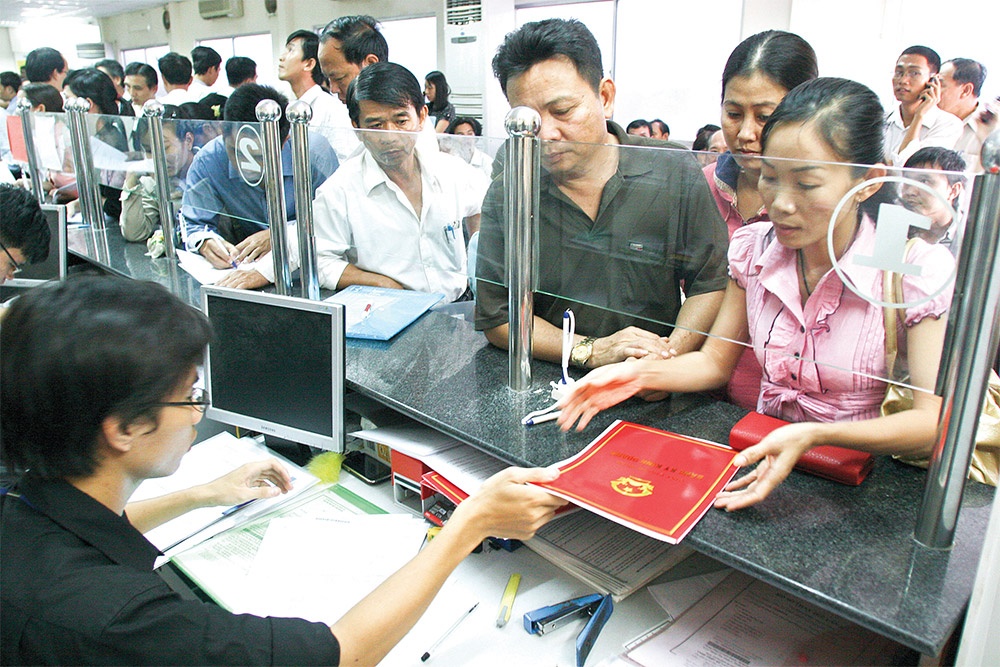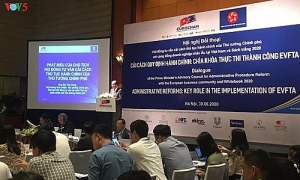Admin delays to be quashed to avert risks
 |
| Administrative changes must add clear benefits to management efficiency, Photo Le Toan |
The Government Office last week promulgated a notice summarising the findings of the government’s Steering Committee for Administrative Reform. The notice highlighted that administrative reforms in the first half of the year were implemented actively and comprehensively.
These efforts contributed to enhancing the investment and business environment, reducing inconveniences for individuals and businesses, attracting investment, and bolstering socioeconomic growth.
However, the Government Office also acknowledged certain shortcomings in the administrative reform process. “The direction and operation of administrative reforms in some localities remain passive, inflexible, and not very effective, particularly in addressing issues affecting production and business activities,” it said.
At the end of July, six associations, including the Ho Chi Minh City Food and Foodstuff Association, the Association of Vietnamese High-Quality Product Enterprises, and the Vietnam Association of Seafood Exporters and Producers, expressed concerns about the draft decree amending Decree No.09/2016/ND-CP on food fortification with micronutrients.
The associations sent letters to Prime Minister Pham Minh Chinh, Deputy Prime Minister Le Thanh Long, and others. They noted that businesses are not seeking additional support policies but instead desire a reduction in regulatory burdens.
This sentiment has been voiced repeatedly, most recently at a June meeting between business associations and the Central Institute of Economic Management (CIEM) under the Ministry of Planning and Investment (MPI). The meeting focused on implementing Resolution No.02/NQ-CP which was released in January and outlines key measures to improve the business environment and enhance national competitiveness in 2024.
Despite ongoing efforts, concerns remain regarding the draft decree’s alignment with national strategies, particularly the mandatory fortification of salt with iodine and wheat flour with iron and zinc. The Ministry of Finance’s draft, released for public comment in early July, did not reflect the government’s directives, leading to further apprehension among businesses. These businesses are worried that new regulations could increase costs and complicate compliance without clear benefits.
Additionally, the MPI’s report on the implementation of Resolution 02 in the first half of the year highlighted several issues, such as expanding tax subjects and adjusting tax rates in the draft Law on Special Consumption Tax. Other concerns include new requirements for vocational skill certificates and business conditions in the draft Law on Employment, and ambiguities in regulations related to the management of financial contributions to the Vietnam Environmental Protection Fund.
The fund is intended to support waste recycling and treatment, but the proposed recycling cost norms and implementation details have caused concern among manufacturers and importers.
The report stressed that these issues contribute to administrative burdens without clear benefits in management efficiency. For instance, the draft Law on Standards and Technical Regulations requires enterprises to notify the Ministry of Science and Technology of basic standards, even when products like drugs, food, and cosmetics must also be registered with specialised ministries. This duplication of processes increases compliance costs and administrative workload for businesses.
Despite the Purchasing Managers’ Index recovering to 54.7 points in June and July, Nguyen Dinh Cung, former president of the CIEM, warned that private sector investment remains below pre-pandemic levels. Cung cited delays in administrative and investment procedures as a significant barrier, affecting industries like wood exports.
“For instance, companies in the wood industry have been unable to fulfill orders due to incomplete investment procedures, which has led to missed opportunities in the seasonal export market,” Cung said.
As legal and administrative delays slow public investment disbursements, economic growth increasingly depends on the recovery of exports, industrial production, and services. Cung cautioned that domestic production capacity might not keep pace with potential increases in foreign demand, limiting growth opportunities.
“Concern that import-export turnover could reach its limit if current production capacity is not expanded. This would pose a risk if foreign demand surges while domestic production cannot meet the increased demand, thus stifling economic growth potential,” Cung added.
Prime Minister Pham Minh Chinh, who is also head of the Government’s Steering Committee for Administrative Reform, last week called for urgent action to identify and remove institutional, policy, and regulatory bottlenecks. He stressed the importance of addressing the pressing challenges faced by individuals and businesses. Additionally, relevant authorities must issue detailed regulations, especially those related to laws passed at the seventh session of the 15th National Assembly.
The prime minister urged a rapid review and resolution of contradictory, overlapping, and outdated regulations, as well as a simplification of licences related to business activities.
| Le Duy Binh, managing director Economica Vietnam
Private enterprises are crucial in achieving the government’s ambitious economic growth target of 7 per cent for 2024. This goal follows the impressive economic performance in the second quarter and the first half of 2024, prompting the Ministry of Planning and Investment to adjust the growth scenario for the year. The 7 per cent growth target surpasses the National Assembly’s original projection of 6-6.5 per cent and exceeds forecasts from international organisations. The International Monetary Fund predicts a growth rate of 5.8 per cent, the World Bank estimates 5.5 per cent, and the Asian Development Bank forecasts 6 per cent. The strong economic growth seen in the second quarter and the first six months of 2024 results from substantial efforts and decisive actions. Maintaining this growth trajectory could make achieving the 6.5 per cent target feasible. Contributing factors include stable government spending, robust consumer spending, and an increase in import-export turnover. Additionally, consumer spending is expected to rise due to the wage increase policy effective from July and the continuation of the VAT policy at 8 per cent until the year’s end. However, setting a growth target of 7 per cent demands extraordinary determination and effort, with the private enterprise sector playing a pivotal role. Private enterprises contribute nearly 45 per cent of the country’s GDP, account for more than 40 per cent of total capital, provide jobs for 85 per cent of the labour force, and represent 35 per cent of total import turnover and 25 per cent of export turnover. To drive economic growth, it is essential to promote private investment. This requires creating a safe and favourable investment and business environment to inspire confidence among businesses, from large corporations to small enterprises and startups, to pursue their business ideas. Currently, private investment activities are showing signs of slowing down, with the number of newly started large-scale projects remaining limited. The hesitation among private investors often stems from concerns about complicated legal procedures and the prolonged process of handling documents, which can lead to uncertainty and caution in making decisions. For long-term growth, businesses must invest now, mirroring the government’s current efforts to plant the seeds for future success. The growth we witness today results from careful preparation and investment in previous years. If we can foster substantial private investment in 2025, it will lay a solid foundation for the government and authorities to consider another ambitious growth target. Achieving a 7 per cent GDP growth rate in 2025 would be a promising indicator for a pivotal year, setting the stage for the 2026-2030 planning period. |
 | Administrative reforms – key to unlocking EVFTA In the times of post-pandemic recovery, the EU-Vietnam Free Trade Agreement (EVFTA) and administrative reforms will be the key to boosting trade relations between Vietnam and the EU. |
What the stars mean:
★ Poor ★ ★ Promising ★★★ Good ★★★★ Very good ★★★★★ Exceptional
Related Contents
Latest News
More News
- Congratulations from VFF Central Committee's int’l partners to 14th National Party Congress (January 25, 2026 | 09:46)
- List of newly-elected members of 14th Political Bureau announced (January 23, 2026 | 16:27)
- 14th Party Central Committee unanimously elects To Lam as General Secretary (January 23, 2026 | 16:22)
- List of members of 14th Party Central Committee announced (January 23, 2026 | 09:12)
- Highlights of fourth working day of 14th National Party Congress (January 23, 2026 | 09:06)
- Press provides timely, accurate coverage of 14th National Party Congress (January 22, 2026 | 09:49)
- Press release on second working day of 14th National Party Congress (January 22, 2026 | 09:19)
- Minister sets out key directions to promote intrinsic strength of Vietnamese culture (January 22, 2026 | 09:16)
- 14th National Party Congress: Renewed momentum for OVs to contribute to homeland (January 21, 2026 | 09:49)
- Party Congress building momentum for a new era of national growth (January 20, 2026 | 15:00)


 Tag:
Tag:

















 Mobile Version
Mobile Version